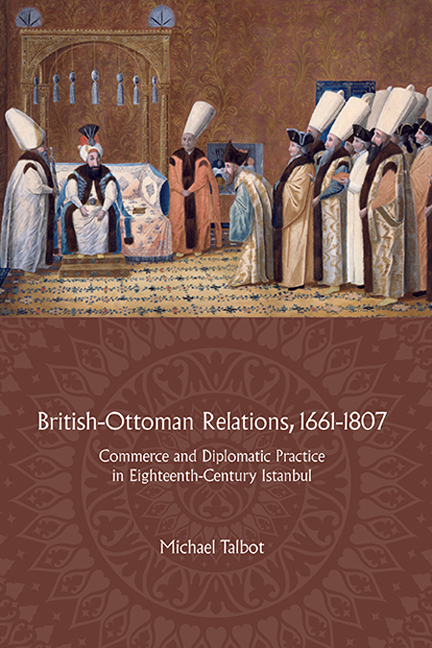 British-Ottoman Relations, 1661-1807
British-Ottoman Relations, 1661-1807 Book contents
- Frontmatter
- Dedication
- Contents
- List of tables and figures
- Acknowledgements
- Note on languages, place names, dates, and currencies
- List of abbreviations
- Introduction: De/re-constructing the history of British–Ottoman relations
- 1 The framework of relations
- 2 The office of ambassador
- 3 Trade and diplomatic finances
- 4 Gift-giving
- 5 Diplomacy as performance
- 6 Negotiating disputes
- Conclusions: De/re-constructing British–Ottoman diplomacy
- Bibliography
- Index
3 - Trade and diplomatic finances
Published online by Cambridge University Press: 29 July 2017
- Frontmatter
- Dedication
- Contents
- List of tables and figures
- Acknowledgements
- Note on languages, place names, dates, and currencies
- List of abbreviations
- Introduction: De/re-constructing the history of British–Ottoman relations
- 1 The framework of relations
- 2 The office of ambassador
- 3 Trade and diplomatic finances
- 4 Gift-giving
- 5 Diplomacy as performance
- 6 Negotiating disputes
- Conclusions: De/re-constructing British–Ottoman diplomacy
- Bibliography
- Index
Summary
British trade with the Ottoman empire
In January 1806, about a year before he evacuated the British merchants from Istanbul as the start of the British–Ottoman War, ambassador Charles Arbuthnot concluded a major customs agreement with the reisülküttab, Ahmed Vasıf Efendi. This agreement reiterated the fixed customs rates (resm-i gümrük) due from British merchants at three per cent as per the Capitulations, and detailed the tariffs for dozens of types of commodities subject to import duty (eşyā-yı āmedīye) and export duty (eşyā-yı deftiye). This is one document of many that saw the British ambassador attempt to secure and maintain favourable trading rights for the Levant Company merchants from the Ottoman government. Such records are not only excellent indicators of trade, but can tell us much about the nature of British–Ottoman relations, at the heart of which, as we have seen, was commerce. The merchants, the Levant Company, and the ambassador operated within a particular diplomatic framework, a key part of which saw the merchants relying on the ambassador's efforts to protect their trade, the Company relying on the merchants to pay their dues, and the ambassador relying on the Company to pay his expenses for maintaining British friendship with the Ottoman Empire. A key component of this cycle was diplomatic finance, and this chapter will examine the relationship between trade levels and ambassadorial finance to understand how the British embassy in Istanbul functioned.
Compiling statistics for British–Ottoman trade in the eighteenth century has its problems. Whilst the Ottoman archives hold valuable information on commercial interactions, that information can be less useful when compiling long-term trends due to the organisation of the archive's collections, and nature of the documentation. As Edhem Eldem argued in his study of French– Ottoman trade in the same period, the European archives in this regard are far more accessible and coherently organised, and so the statistics here are based largely on British data. There is an invaluable source for trade statistics in the British government's customs ledgers from 1697 to 1803, which list the quantity and value of every commodity traded between England and the rest of the world.
- Type
- Chapter
- Information
- British-Ottoman Relations, 1661-1807Commerce and Diplomatic Practice in Eighteenth-Century Istanbul, pp. 71 - 104Publisher: Boydell & BrewerPrint publication year: 2017


